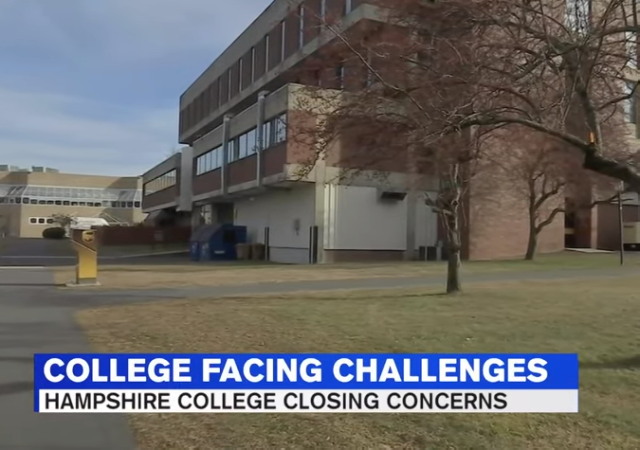Did Far Left Politics Contribute to the Potential Downfall of Hampshire College?
“an object lesson in the financial perils of wokeness for colleges”

Remember when Hampshire removed the American flag after Trump won in 2016? Could the school’s politics be part of their problem?
Greg Piper writes at the College Fix:
It took down the flag after Trump’s election. It opposes ‘intense debate.’ Its freshman class is 15 students.
If you need an object lesson in the financial perils of wokeness for colleges, look no further than Hampshire College in Massachusetts.
It got on the national radar after Donald Trump’s election, when the private liberal arts school responded to campus unrest by removing the American flag (among others) from campus. Then-President Jonathan Lash said it was an impediment to “addressing racist, misogynistic, Islamophobic, anti-immigrant, anti-Semitic, and anti-LGBTQ rhetoric and behaviors.”
He doubled down when criticized, saying the American flag’s presence interfered with the ability of students to express themselves. Everyone who is not delusional correctly recognizes that the flag symbolizes our constitutional right to express ourselves – even when we burn it. (The flag was flown again after two weeks.)
A year later, Lash’s administration canceled a speech by a gun-rights activist – two hours before its scheduled start – because the sponsor hadn’t disclosed it might provoke “intense debate.”
Lash didn’t last, and Hampshire might not, either.
We told you in February that the unconventional college – which has no grades, no majors and no test scores it will consider in applications – was on the brink of financial collapse and might lose its accreditation. One statistic illustrates just how much trouble it’s in:
Fifteen.
That’s the number of incoming students who have enrolled in the fall term, according to an eye-opening profile in The Boston Globe. Last year’s class was 290 students. Hampshire has lost more than half its usual enrollment for all classes, leaving around 600 students on campus.
Donations tax deductible
to the full extent allowed by law.








Comments
All the parents will be able to stay at the same B & B when the Class of ’22 graduates.
And the Graduation ceremony will be 45 minutes tops!
Then-President Jonathan Lash said it was an impediment to “addressing racist, misogynistic, Islamophobic, anti-immigrant, anti-Semitic, and anti-LGBTQ rhetoric and behaviors.”
Lash is in his 70s. So much for being the adult. Instead, he jumped on bandwagon shouting the progressive narratives de jour, as if he were a puerile sophomore.
Is this Oberlin College’s fate?
Yes, I think so, but in view of their deep pockets I think it’ll take them a long time to go out of business. Think Sears Roebuck.
Like Evergreen, a degree from this school is actually an impediment to getting hired.
“If teaching has any purpose, it is to implant true insight and responsibility. Education must lead us from irresponsible opinion to true responsible judgement. It must lead us from chance and arbitrariness to rational clarity and intellectual order.”
Ludwig Mies Van Der Rohe
I’m glad to see institutional Darwinism alive and well.
Maybe the crazy politics contributed to Hampshire’s downfall, but folks pretty much knew that the school was in a death spiral and I’m guessing few committed to starting because they knew they weren’t going to finish.
The 15 in the freshman class will probably drop to zero as the news gets out.
The business model of the small liberal-arts college probably isn’t sustainable for much longer. The highly selective places where the upper class send their children, like Williams, Middlebury, Mount Holyoak and the like will stay okay. But there’s this whole tier of state and regional small schools that are losing their raison d’etre. Most of their names start with “saint.”
The parade of failures from the last five years is about to get wider and longer.
And that makes me sad. I used to work at a state-level liberal arts college (now doing all it can to stave off its death) and we did a lot there for a lot of needy students. But the place will not be long for this world.
I graduated from one of those colleges 40 years ago. Sad to say but yes, a fair number of them have lost their grounding and original purpose for being. As the world moves to on-line certification of skills and away from in-residence general education, these colleges won’t last.
I think there will be a deeper crisis the higher education than most people are expecting. That business has spent the last several decades gradually pricing itself out of the market, and that includes the famous names.
They admitted from their early-decision pool in December, then announced they would not admit a class in the regular admission cycle. Provisions were made by other colleges to offer admission to the early admits, as everyone knew Hampshire might not last. So the 15 is not a fair measure of their market position.
Their average test scores have been going down, I recall reading. That’s probably why they don’t consider them any more. Don’t have to report them.
Still, this is pretty bad for a college whose students are allowed to cross-register for classes at Amherst, Smith and Mt. Holyoke. That alone should make it attractive for some kids who don’t have the stats to be admitted to those schools — go to Hampshire and take their classes anyway.
If they can’t survive even with that special feature, pfft.
This is the result you get when a school goes overboard with progressive thought and policy. It’s usually a slow process when they do this policies piecemeal. They will never reverse all of these policies and become a truly conservative institution because they don’t believe it those values.